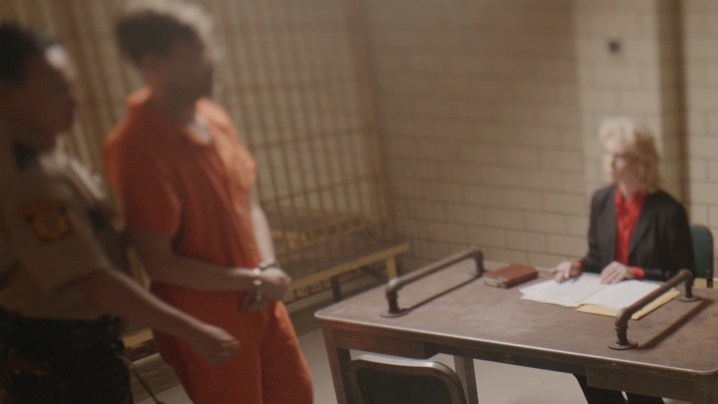It’s spooky season this month, and that means the atrocity mine is currently being plundered by content creators across America. The three-episode docuseries Conversations with a Killer: The Jeffrey Dahmer Tapes, directed by noted documentarian Joe Berlinger (Brother’s Keeper, Paradise Lost), is Netflix’s second project tackling the infamous cannibal/necrophiliac/serial killer to debut in a matter of weeks. It follows Ryan Murphy’s 10-hour miniseries drama, Dahmer-Monster: The Jeffrey Dahmer Story. This Dahmer double dose mirrors the barrage of Ted Bundy content that Netflix put out in early 2019, following up the Zac Efron-led drama Extremely Wicked, Shockingly Evil and Vile with the docuseries Conversations with a Killer: The Ted Bundy Tapes (also directed by Berlinger).
As was the case with Bundy, Netflix is convinced that a multipronged examination of Dahmer could lead to a better understanding of his psychology and motivations, teaching viewers warning signs or expanding our capacity for empathy. Or maybe they recognize that people are addicted to unspeakable tragedies and will do anything they can to maximize viewers’ compulsion for true crime? Attempting to satisfy on all accounts, The Dahmer Tapes oscillates uneasily between character study, social commentary, and pure shock value, landing somewhere in between all three.
In Dahmer’s own words

Like the Bundy tapes, the draw here is the audio of Dahmer’s interviews with his attorney, giving the audience never-before-heard firsthand accounts of Dahmer’s crimes in his own voice. Our surrogate into this tale is Dahmer’s untested young defense attorney Wendy Patrickus, who at one point compares her situation to that of Clarice Starling in The Silence of the Lambs. Except that Dahmer is a far cry from Hannibal Lecter. While Lecter is sophisticated and conniving, Dahmer is disarmingly straightforward, reflecting on his actions in a mundane monotone.
Berlinger goes through all the necessary channels, including a quick examination of Dahmer’s upbringing, his lonely social life, and anything that may have led Dahmer down this murderous path. But beyond ordinary family dysfunction, nobody– including Dahmer himself– can explain his actions. He wonders why he is the way he is and why he doesn’t feel what others feel. But he cannot figure it out, and neither can we, and neither can Patrickus, because Dahmer possesses these twisted compulsions and we do not.
While hearing Dahmer’s voice is fascinating, it is not necessarily informative. His rote retelling of his killings and of his desires are so simple that even the team of psychologists that try to add insight end up repeating themselves often over the course of the three-hour series. Very quickly we know that Dahmer is incapable of empathy and that he is a deeply antisocial loner who needs to be in complete sexual control, but that is all anyone is able to really tell us for the series’ duration.
Witness testimony spotlights Dahmer’s inhumanity

To the documentary’s credit, a true effort is made to center on the stories of Dahmer’s victims, and the deeper social and cultural context of his murders. Most of his 17 victims were young gay men of color within the Milwaukee nightlife scene. Michael Ross, an older gay black man who was acquainted with a few of Dahmer’s victims, provides insight into the culture and a much-needed emotional focus into how Dahmer terrorized the community. Vernell Bass, Dahmer’s neighbor, gives a heartbreaking account of how Dahmer gained his trust and his feelings of betrayal when he found out who he really was. Jeff Connor, a friend of one of the victims, breaks down when recounting dropping his friend off with Dahmer in the middle of the night, making him the last person besides Dahmer to ever see him alive.
These interviews are the ones that provide the heart and soul of the story. Hearing about how the police chose to ignore the dozens of missing persons cases regarding young gay minorities, as well how Dahmer was able to use his white, Midwestern “normalness” to evade any suspicion, sparks introspection and a true investment into what this tragedy can teach us. But what about Dahmer himself? Was there a method to his madness and if so, how did he carry it out?
The documentary doesn’t cut deep enough for true revelations

After one particularly compelling victim anecdote, Berlinger zips us back into Dahmer’s childhood, where his school friend, Eric Tyson, describes his young classmate’s infatuation with dead animals and skulls. Dahmer corroborates this information in his own words, saying how he liked to cut them up and examine their insides, almost as another man would nonchalantly describe how he enjoys to crack open a cold beer and watch the Knicks after work. We then learn, from Patrickus, of the most terrible things he did: playing around with his victims after he killed them and dismembered their corpses.
Berlinger understandably holds back from giving us Dahmer’s own account of this action, which imprinted Dahmer on American popular culture in the first place. But since the draw to get people to watch was having this sort of bombshell on record, the average listener who wants their full dose of salacious detail from the series may feel a little cheated without the juicy, gory confessionals of Dahmer describing his cannibalism or his necrophilia. Without that level of unrestricted access, we are stuck with the same armchair psychological analyses that are unable to give us the understanding we may crave, Dahmer tapes or no Dahmer tapes.
The final episode spends a lot of time discussing Dahmer’s insanity defense before eventually recounting his murder by another inmate in prison. Patrickus, as his trusted confidant and attorney, believed he needed serious therapeutic help that he wouldn’t get in prison. She had developed sympathy for him, hearing that same plaintive, sad voice tell hours and hours worth of depressing stories. It is hard not to agree that Dahmer was insane on some level, but also hard to imagine Dahmer having ended up anywhere but in prison.
A banal portrait of banal evil
Despite Berlinger’s best attempts, it is hard for anyone to really care what happened to Dahmer. Dahmer himself admitted that he probably deserved to die, that his illness was irreversible and he didn’t know how to get better. His only remorse was his lack of remorse. The killings and implications of the killings were ultimately more fascinating than the man himself, despite the amount of attempts made to get to know him better.
But his crimes were fascinating indeed, and as much as we all would like to ignore it, they are what keeps people glued to shows of this nature. As E. Michael McCann, the Milwaukee former district attorney, states resignedly toward the end of the series: “I hoped that the world would forget about Dahmer, that he would be placed in the ash bin of history.” Yet Netflix, and our own darkest impulses, could never allow such a thing, even if there really might be nothing left to say about the man.
Conversations with a Killer: The Jeffrey Dahmer Tapes is currently streaming on Netflix.
Editors’ Recommendations







